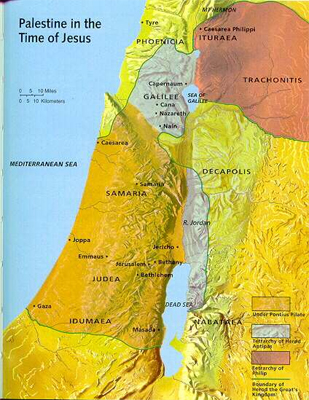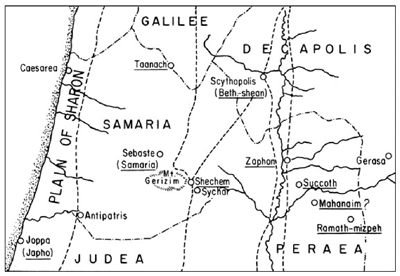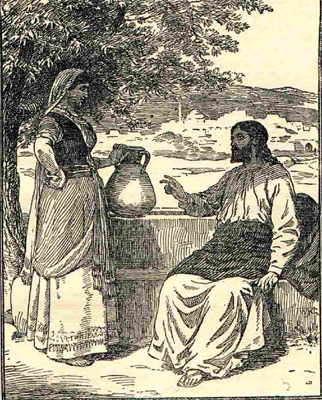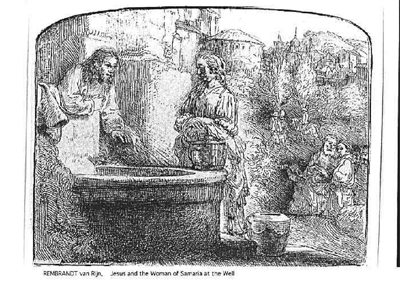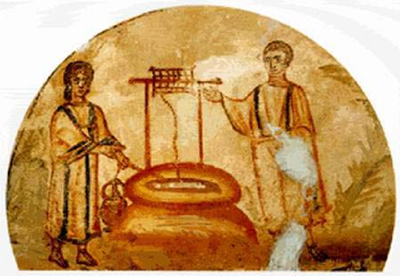
Christmas
Easter
Pentecost
All Saints
Christ The King
Confirmation
Palm/Passion
Reformation
Stewardship
Books of the Bible
Lenten Series
Christmas Dramas
Videos
Series A - Matthew
Series B - Mark
Series C - Luke
Series D - Other
To contact
Edward F. Markquart
info@sfs.com
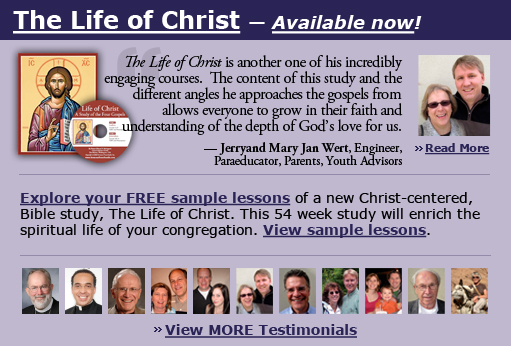
Series A
EPIPHANY 3A The following Bible study is from a larger course entitled THE LIFE OF CHRIST: A Study in the Four Gospels. This 54 week course for the laity will be available for congregations in 2006. Basic text for the course: SYNOPSIS OF THE FOUR GOSPELS, Kurt Aland, English Edition, P. 28-29. #31. Discourse With The Woman Of Samaria This is one of the great texts in the Bible. -But he had to go through Samaria. Jesus HAD to go through Samaria. It was his God-given destiny to travel in Samaria and thereby reveal God’s love for the Samaritans.
http://www.fiu.edu/~evansk/REL2011/jesus/map.html On the above map, imagine a route from the area of John the Baptist (the wilderness of Judea northeast of the Dead Sea) to the region and city of Samaria. According to the Gospel of John, Jesus had recently been with John the Baptist at Aenon near Salim where John said, “He must increase but I must decrease.” With John the Baptist at Aenon, we also hear words which relate to this text for today about the “living water.” In John 3:34, it says, “He (Jesus) gives the Spirit without measure.” Repeatedly, in this course, we will learn of Jesus giving the Spirit of the Living and Loving God fully to people around him. The conversation with “the woman at the well” seems to have occurred on Jesus’ journey from the Wilderness of Judea with John the Baptist to Galilee. Kurt Aland, in his SYNOPSIS OF THE FOUR GOSPELS, places the story here. -So he came to a Samaritan city called Sychar, near the plot of ground that Jacob had given to his son Joseph. Jacob's well was there, and Jesus, tired out by his journey, was sitting by the well. It was about noon. Notice the “trivial details” that we hear repeatedly from the Apostle of John, the eyewitness who wrote the Gospel of John. “Jesus was tired out by his journey;” “he was sitting by the well;” “It was about noon.” As has been said often in this course, we will repeatedly encounter John, the beloved disciple, as being an eyewitness of the life of Jesus. We are going to be surprised at the numerous historical details that John will offer to us as “our reporter on the scene.” Either John was an incredible imposter who created historical details in order to give the appearance of historical accuracy or he was actually a recorder/a reporter on the scene who accurately told us what was happening. After years of Biblical study, I have come to the conclusion that John was our reporter on the scene. Whenever we study in the gospel texts from the Gospel of John, we will encounter these historical, juicy little details such as the time being “about noon.” Circle the words, “Samaria” and “Samaritan city.” We remember the deep hostility between Jews and Samaritans. Samaritans were traditionally enemies of the Jews. The Samaritans and Jews did not mix with each other nor intermarry with each other. Jews and Samaritans had different centers of worship, different capital cities, and different Bibles. The Jews believed that the center of worship was in Jerusalem; the Samaritans believed that the center of worship on Mount Gerazim. Jews believed the Scripture consisted of both the Law and the Prophets. The Samaritans believed the Scripture consisted of only the Law but not the Prophets. The Jews had their temple in which to worship the true God and the Samaritans had their temple in which to worship the true God. This is the first of many stories in the gospels which involve Samaritans. A student of the Life of Christ needs to get images of the Samaritans into one’s mind. The Samaritans are a theme in the teaching, preaching and actions of Jesus. In Jewish eyes, Samaritans were half-breeds, ethnic traitors, and "the bad guys.” Circle the words, “Jacob’s well.” Jacob’s well was near the city of Sychar. Examine the following website: http://www.edwardfudge.com/sychar.html., This website has a fine article about Jacob’s well. Carefully examine the map on that website to get a feeling for the location of the well. This well is located close to Mount Gerazim which was the central place of worship for the Samaritans. See the map below. The story of Jacob’s well is found in three world religions: Judaism, Islam and Christianity. This story applies to our contemporary situation. We know of the conflict between Jews, Muslims, and Christians. All three world religions claim Abraham, Jacob, and Jacob’s well as part of their sacred stories. It seems that people of all three religious persuasions believe that they have “the corner” on God’s truth, and people of all three religions need to drink of the “living water” or “running water” at the bottom of Jacob’s well. Perhaps if Jews, Muslims, and Christians drank deeply of the living waters of the Spirit of God, there would be fewer tensions between the groups and a lessening of self-righteousness attitudes found within these religions. The following is a map of Samaria. It shows the location of Mount Gerazim in New Testament times. The Samaritans believed that the center of worship was not Jerusalem but Mount Gerazim. The word, “Gerazim,” can be spelled with an “a” or an “i” e.g. Gerizim or Gerazim.
http://www.fiu.edu/~evansk/REL2011/jesus/map.html -A Samaritan woman came to draw water, and Jesus said to her, "Give me a drink." (His disciples had gone to the city to buy food.) Jesus violated two religious laws by speaking with a Samaritan woman: she was a woman and she was a Samaritan. To privately speak with a woman who was not your husband was against the religious laws of both the Samaritans and Jews. -The Samaritan woman said to him, "How is it that you, a Jew, ask a drink of me, a woman of Samaria?" (Jews do not share things in common with Samaritans.) The woman knew the religious rules of the day. Jews and Samaritans were not to speak with each other. These were old religious prejudices against each other, similar to old prejudices that exist today between religious, ethnic and national groups. Of course, the Apostle John is the story teller and he is setting us up for the truth that Jesus will offer the woman "living water" which the text is is all about. Not only the Biblical text but the whole Bible and the life of Jesus. Jesus wants to give all of us this "living water" but...we are getting ahead of ourselves. -Jesus answered her, "If you knew the gift of God, and who it is that is saying to you, "Give me a drink,' you would have asked him, and he would have given you living water." What is the primary gift that the Lord God wants to give to each one of us children here on earth: the Living Water of God. Who is Jesus? The one who gives the Living Water. This same principle was true two thousand years ago and is still true to day. It is especially true today when Jews, Muslims and Christians are still fighting vicious wars. People of all three faiths NEED to drink the Living Water that the Lord offers us. It is THE primary gift of God. Circle the word, “living water.” Jacob’s well is 125 feet deep and drops down, not to a spring, but to an underground stream. Centuries ago, the underground waters of that stream were called “living waters.” Today, these waters are still flowing underneath the ground, like an underground river. The “old well” is still working after all these centuries, and tourists to the Holy Land regularly visit it. Down at the bottom of that well is “living water” which is an underground river. -The woman said to him, "Sir, you have no bucket, and the well is deep. Where do you get that living water? Are you greater than our ancestor Jacob, who gave us the well, and with his sons and his flocks drank from it?" Circle the words, “living water.” That is what we all want: the living water that Jesus offers to us. What is that living water? We will discover that the living water is the Spirit, the Holy Spirit, the Spirit of Jesus, the Spirit of the Lord of love. All people need the living water that Jesus offers. A parallel passage is from John 7:37-38, “If anyone thirst, let that person come to me and drink. He who believes in me, out of his heart shall flow rivers of living water. Now this he said about the Spirit …” The Holy Spirit is the living water. Write down “John 7:37-38” near the words, “living water.” Also write down “living water = the Spirit.” When a person believes in Christ, out of his heart will flower rivers of living water. Living water is the Spirit of Jesus: his Spirit, his love, his compassion, his gentleness. It is Jesus’ Spirit living in our spirit. The living water will flow from our hearts like a flowing river. Love, joy, peace, patience, kindness, goodness, faithfulness, gentleness, and self control: these qualities all flow from within us and bring life to all that we touch. Human beings are composed of four parts: physical, mental, emotional, and spiritual. Each of these four parts of every human being can grow or diminish. Our bodies can grow and become more muscular. Our minds can grow and become sharper. Our emotions can grow and become more wholesome and mature. Similarly, our spirits can grow and become more vibrant. Jesus’ Spirit comes to live in our spirits. When Jesus’ Spirit lives in our inner spirit, our inner spirit grows and enlarges. The Spirit of Jesus’ love and compassion comes to live in our love and compassion, and our love and compassion are transformed. -Jesus said to her, "Everyone who drinks of this water will be thirsty again, but those who drink of the water that I will give them will never be thirsty. The water that I will give will become in them a spring of water gushing up to eternal life." Highlight the phrase: “will never be thirsty.” No wonder the Samaritan woman wanted this water. Underline the sentence, “The water that I give will become in them a spring of water gushing up to eternal life.” The spiritual water that Jesus gives in us will become a shooting up geyser of water, gushing up to eternal life. The living water in us becomes the water of everlasting life. In the Gospel of John, there are often two levels of thought. The physical and the spiritual. Physical water and living water. Born of a woman and born of God. Born from below and born from above. In John’s gospel, there are often two levels to the conversation. -The woman said to him, "Sir, give me this water, so that I may never be thirsty or have to keep coming here to draw water." Yes, the woman wanted that living water and so do we. We want to drink of the living water of Jesus so that out of our heart will flow rivers of living water (the Spirit.) -Jesus said to her, "Go, call your husband, and come back." Oh, oh, a new direction to the conversation. In the Gospel of John, Jesus knows everything. He is at a distinct advantage in conversations and he knew where this conversation was going. -The woman answered him, "I have no husband." She was honest. -Jesus said to her, "You are right in saying, "I have no husband'; for you have had five husbands, and the one you have now is not your husband. What you have said is true!" The woman needed living water; she did not need the condemnation of Jesus for her sinfulness. Jesus did not condemn people who were easy and obvious targets because of their sinfulness. That is, Jesus did not condemn Zacchaeus, the fraudulent tax collector who climbed a tree to get a better view of Jesus on the road below. Jesus did not condemn the woman caught in adultery although self-righteous people, who were blind to their own faults, did. Jesus does not condemn obviously sinful people but offered them something better than condemnation. Jesus offered them Living Water. Jesus got personal with the woman at the well and Jesus gets personal with us also. Like the woman in the story, we often try psychological tricks to avoid Jesus’ personal encounter with our personal lives. But Jesus always gets personal with us and addresses us in the core of our personality and our past. Like Jesus with Nathaniel in John 1, Jesus had a prior knowledge of this woman who had several husbands. Miraculously, Jesus knew her personal history. Similarly and miraculously, Jesus knows our personal history as well. And Jesus asks us personal questions that no one else would think to ask. We all know this about Jesus; that he knows our secret lives that we pretend are not there. -The woman said to him, "Sir, I see that you are a prophet. Our ancestors worshiped on this mountain, but you say that the place where people must worship is in Jerusalem." The woman starts a religious argument to distract the focus of the conversation away from her five husbands and her “live in” friend. She wants to get into a converation about which location is the place of true worship...or which religion is truer than the other. And that is what we human beings still do: talk about the truthfulness of other religions compared to our own religion...as a diversion from the fact that we are not drinking from the Living Water. That hour is coming when people of various religious centers will worship the True God. -Jesus said to her, "Woman, believe me, the hour is coming when you will worship the Father neither on this mountain nor in Jerusalem. What a profound statement: The hour is coming when the Spirit of the True God will not to be worshipped in the holy city of Jerusalem or Gerizim. Not in Rome nor Mecca. Not in St. Paul nor Salt Lake City. -You worship what you do not know; we worship what we know, for salvation is from the Jews. That statement would have upset the woman: that salvation was from the Jews. That is, Jesus was born of the Jews. He was a real human being of Jewish ancestry. -But the hour is coming, and is now here, when the true worshipers will worship the Father in spirit and truth, for the Father seeks such as these to worship him. God is spirit, and those who worship him must worship in spirit and truth." Wow. Highlight it. Underline it. Memorize it. Let those words flow into your mind and heart. True worshippers are those who worship God in Spirit and truth. People were insisting that God was to be worshipped in a certain way e.g. Samaritans wanted people to worship like Samaritans and Jews wanted people to worship like Jews. Jesus said that there would come a time when all people would worship God in Spirit and truth. The Jews of Jerusalem and the Samaritans of Samaria each felt and believed that they had a handle on the religious truth. The Jews of Jerusalem and the Samaritans of Samaria had disdain for each other and condemned each other. (They still do 2000 years later.) -The woman said to him, "I know that Messiah is coming" (who is called Christ). "When he comes, he will proclaim all things to us." The woman knew her Samaritan Bible and Samaritan expectations: the Messiah would come and he would teach people all things about the true God. -Jesus said to her, "I am he, the one who is speaking to you." Right from the “get go” in the Gospel of John, Jesus is the Son of God and Messiah. He doesn’t beat around the bush about his identity in the Gospel of John. Jesus is straight forward and up front: “I am the Messiah. I am speaking to you.” -Just then his disciples came. They were astonished that he was speaking with a woman, but no one said, "What do you want?" or, "Why are you speaking with her?" The disciples were questioning in their minds: “Why are you, Jesus, talking with that kind of a woman?” Jesus was forever breaking the barriers of condemnation. Jesus was breaking at least three socially accepted customs by talking with this woman: 1) She was a Samaritan. Jews and Samaritans did not have anything to do with each other. 2) She was a woman. Jesus was to avoid contact with her, especially having a personal conversation with this woman. 3) She had a bad moral track record, having had five husbands. In America, people would call her a “five time loser.” Jesus broke through such cultural rejections and kindly spoke with her. -Then the woman left her water jar and went back to the city. The woman was on a mission. She wanted to tell others what had been happening to her. She wanted to tell others about this prophet, this Messiah, this…whoever he was. -She said to the people, "Come and see a man who told me everything I have ever done! He cannot be the Messiah, can he?" A reader can feel the excitement in her voice. She is wondering if he could be the long expected Messiah. "Come and see this man." That phrase is at the heart of the Gospel of John and at the heart of all Christian discipleship. Come and see. Come and see Jesus. We heard those words during the call of the first disciples in John's gospel. Andrew found his big brother Simon Peter and said, "Come and see who I have found. The Messiah." Those words are at the heart of every evangelist and witness for Jesus Christ: "Friend, come and see the one who can give you and me Living Water. Don't come and see our church program or pastors but come and see the presence of God who wants to give you and me Living Water, the Spirit of the Living God, to flow within our hearts. This is what Life and Eternal Life are all about." -They left the city and were on their way to him. People then and now are still deeply interested in spiritual things, in transforming people who can help transform our petty little lives. Like always in every century and every culture, people have a thirst for the fresh, living waters of God that refresh our tired-out and exhausted daily lives. -Meanwhile the disciples were urging him, "Rabbi, eat something." We now begin another new topic and theme. We again are working on two plains: a physical plain and a spiritual plain. Food. The disciples are talking about physical food and Jesus begins talking about spiritual food. Of course, John the Apostle is our author and he is quite a philosopher. He knows where this conversation is going. -But he said to them, "I have food to eat that you do not know about." The disciples think to themselves, "What is this food that Jesus is now talking about. He first was talking about Living Water which we don't fully grasp and now he is talking about food which we don't know about." -So the disciples said to one another, "Surely no one has brought him something to eat?" -Jesus said to them, "My food is to do the will of him who sent me and to complete his work. My food is to do the will of him who sent me. Near the word, “food,” write the phrase, “energy intake.” The basic food in a spiritual life is to do the will of God. Jesus taught, "You shall love the Lord your God with ALL your heart, mind and soul and your neighbor as yourself. DO THIS and your shall live. DO THIS and your shall find life." It is in "the doing" that we find out what Jesus was talking about. We recall Jesus's later conversation about his mother when he said, "Those who DO THE WILL OF GOD are my mother, brother and sister." What is the will of God? Books have been written about this, but the will of God is VERY easy. The will of God and the whole Bible can be summarized in eight words: "Love one another as I have loved you." This summarizes the whole Law and the Prophets, the whole Bible, the religous life. You take in energy and power by DOING the will of God, by loving God and neighbor in the circumstances of life that come before you and on your front doorstep. A person is empowered by living a loving life. Circle the word, “sent.” 44 times in John’s Gospel, Jesus says that he has been “sent” from God. At the core of his self-identity, Jesus knew that he was an ambassador of God, that he had been sent by God, that he represented God, that he was/is God. Applying this to our own lives, we are energized when we do the will of God in our lives and accomplish the work that God gave us to do. When we live that way, knowing we are doing the will of God in our daily lives and accomplishing the work here on earth that God gave us to do, that knowledge energizes us. To do the will of God in one’s life is like eating food. That is, we are energized when we know that we are doing the will of God. Of course, none of us does that perfectly. Even so, when we know that we are doing the will of God in our daily lives (via my family, work, friendships, church, service to others), we are energized like we are eating food. Therefore we can understand Jesus when he said that his food (his energy intake) was to do the will of God and accomplish the work that God had given him to do on this earth. -Do you not say, "Four months more, then comes the harvest'? But I tell you, look around you, and see how the fields are ripe for harvesting. The fields are white for the harvest. Jesus wants us to reap a harvest and not only to sow the seeds of Christ. This sentence tells of the great possibility for evangelism through us: that so many people are now ripe for discipleship. We are going to hear more Biblical stories about the “fields that are ripe for the harvest.” Jesus, in this passage, is not emphasizing that we plant the seeds, but that we harvest the seeds. This has enormous implications for the church and our congregation today. We need to know that there are many people around us who are like fields that are ready and ripe for faith in Jesus Christ. We know that only 3% of the population in Seattle attends worship on Sunday morning and that only 25% of our neighboring population is a member of a local congregation. Focus on the words, "Look around you." That is what the Church of Jesus Christ needs to do today. To look around us and we see a world that NEEDS the Living Water that Jesus offers. Violence between nations, religions, ethnic groups. Verbal violence between poltiical parties, husbands and wives, neighbors. In our hearts, we know that the world around us that is full of incomprehensive hate and division needs the Living Water of the Spirit of peace that only the Living Lord can bring. That is what Jesus gives: the Living Water of the Living God. -The reaper is already receiving wages and is gathering fruit for eternal life, so that sower and reaper may rejoice together. Jesus is emphasizing that the time is not simply for planting seeds but for harvesting the crop. There were and are a whole lot of folks around us who know that they need something in their lives, that something is missing in their lives, that something is missing in this messed up world of ours today. In this text, Jesus is focusing on the reaper and not the sower. -For here the saying holds true, "One sows and another reaps.' I sent you to reap that for which you did not labor. Others have labored, and you have entered into their labor."
What is your testimony? What is my testimony? What is the personal story of our lives that we can share with people how the Lord has transformed our lives and made them better? What is your personal story? What is mine? It is our personal stories that help many people to believe in the possibility that they, too, can find and drink from the Living Water of God that can transform our lives. -So when the Samaritans came to him, they asked him to stay with them; and he stayed there two days. The Samaritans asked Jesus to stay with them and he did for two days. If a person is a seeker, we ask the Lord to stay with us for a while, to remain in our presence so we can begin to absorb his teachings and truths about God and our personal lives. -And many more believed because of his word. Many Samaritans initially believed because of the woman’s testimony. We discover that one of the most powerful tools for evangelism is sharing our own personal testimony, our own personal story of the way that God has worked in our lives. Each of our testimonies is different. Some testimonies are more dramatic than others. But all Christians have a personal story/or stories of how God has worked in our lives. We are to learn to tell those stories personally and boldly. There is power to our personal stories of faith. This does not mean that we as Christians are to work up a “canned story” about how we accepted Jesus as our Lord and Savior. Rather, the Spirit’s work in our lives is usually more complex than that. We are simply to tell others about the Spirit of Christ in us, and how Christ’s Spirit has worked in our lives. There is power in those stories, in those personal stories, in those personal testimonies. This is the first reference in the Gospels to sharing a personal testimony about Christ, and the woman at the well becomes an example for our lives so that we are more willing and courageous to share our own testimonies. Ultimately, the Samaritans themselves came to believe, because they heard for themselves. The testimony of another person may get your attention initially, but ultimately, the Spirit of Christ works in one’s own life in a unique way. A person moves past the testimony of another and gradually a person comes to believe in Jesus Christ. The Samaritans did not say that they were “born again.” The Samaritans said that they came to believe. In the Gospel of John, the dominant motif is that each one of us comes to believe in Jesus Christ. -They said to the woman, "It is no longer because of what you said that we believe, for we have heard for ourselves, and we know that this is truly the Savior of the world." We have heard for ourselves and WE KNOW that this is the Savior of the world. There comes a time in our lives when we do not rely on the testimony of others or rely on our parental heritage or our Christian home from the past. There comes a time when the primary power is not what our parents said or our big brother said or our friends felt. Rather, there is a time when we have heard for ourselves. My heart has finally heard the message; my mind has finally been opened; my spirit is finally in tune with God's spirit. There comes a time when a person finally and personally knows that Jesus is true, that God is true, that the Living Water is true, and that I need to drink of this Living Water of the Living God. Painting And The Imagination:
http://membres.lycos.fr/apax2/images/jn04b/index.htm
http://membres.lycos.fr/apax2/images/jn04b/index.htm
http://membres.lycos.fr/apax2/images/jn04b/index.htm
|
|
